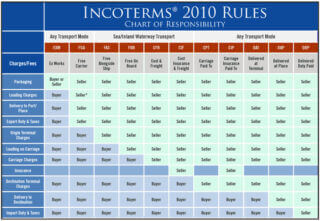GLOSSARY OF INCOTERMS
Incoterms 2010 in Turkish language
The seventh revised version of the Incoterms clauses of the International Chamber of Commerce was published in late September. This revised version takes into account new applications in commerce and transport. Incoterms regulate the distribution of transport costs, risk transfers and details of activities in national and international sales transactions. The obligations of buyers and sellers are clearly described for each clause with a 10-point diagram, and illustrated explanations are added to facilitate the selection of the right Incoterm. Application notes were found before each clause and the basic content was summarized.
Incoterms are not a law, but an agreement must be concluded between the buyer and the seller in addition to the sales contract. It comes into force if it is fully agreed between the buyer and the seller. The legal and special provisions of certain contracts between the parties prevail over the Incoterms.
DSLV commentary; under certain conditions (ex: EXW), export customs clearance procedures, obtaining an export license, etc. the buyer must provide. However, as a general rule, in accordance with customs and foreign trade laws, sellers and exporters are responsible for this. In this regard, the buyer’s obligation does not apply.
The agreement on an Incoterms clause should be as follows:
3-letter abbreviation / clear description of the site / Incoterm status (no date on which the old Incoterms were repealed) Example: FCA Bonn, Factory II, Address Example 7, ICC Incoterms 2010
An overview of the changes:
In the Incoterms 2010 (revised), the number of conditions increased from 13 to 11.
New clauses
Four conditions have been repealed, but 2 new clauses have been created: DAP (Delivered At Place-Delivery) and DAT (Delivered At Terminal-Delivery) have replaced DAF, DES, DEQ and DDU and can be applied in any mode of transport.
The DAT clause means that the goods are delivered to the buyer at destination to be unloaded by the means of transport, replacing the previous DEQ clause and, unlike DEQ, multimodal (for multi-vehicle) can be used.
The DAP clause means that the goods are delivered to the buyer at a specific time to be unloaded by the transport vehicle. DAP replaces the previous DAF, DES and DDU.
In both cases, the seller bears the costs of transporting the goods to the designated place / the risk of damage linked to the terminal.
New clause structure
The innovations in the 2010 Incoterms include the segmentation of seven multimodals, which can be applied to all modes of transport, and four clauses which can only be applied to maritime transport.
Clauses concerning all modes of transport:
EXW – Ex Works
FCA – Free Carrier. The exporter clears the goods for export and delivers them to the transporter
CPT – Carriage Paid To
CIP – Cost Insurance and Freight
DAT – Delivered at Terminal
DAP – Delivered at Place
DDP – Delivered Duty Paid
Sea transport clauses:
FAS – Free Alongside Ship – Free delivery alongside the ship
FOB – Free On Board- Free delivery on board
CFR – Cost and Freight – Cost and Freight Paid
CIF – Cost, Insurance and Freight – Cost, insurance and freight paid
In terms of risk transfer, FOB, CFR and CIF have also been modernized. Provided that the ship has not passed the ship’s rail, the seller was responsible for all damage and loss of the goods. The transfer of risk with the new Incoterms 2010 takes place only after the goods have been correctly loaded onto the ship.
Security enters the Incoterms
Preventing terrorist attacks in the international transport chain has long been a central issue. Incoterms 2010, taking into account current events, adding additional specifications to certain clauses (A2 / B2 or A10 / B10 at certain points), to determine which party will bear the costs related to security measures.
Insurance
Only the terms CIF and CIP stipulate that the seller must insure the goods. The seller must provide an insurance policy against losses and losses that the buyer will suffer during the transport of the goods. Under the CIF and CIP conditions, the buyer must know that the seller is obliged to take out multi-risk insurance with minimum cover. The reason is that minimal coverage is possible, especially for bulk goods. The customer must comply with more comprehensive insurance regulations.




